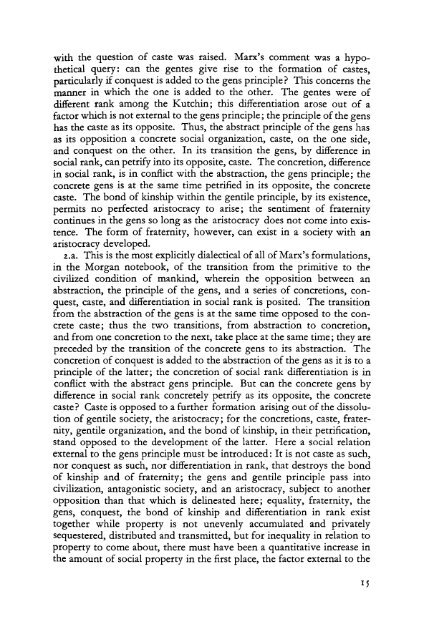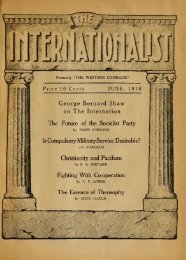- Page 2 and 3: Among the most important of the mat
- Page 4 and 5: Q U ELLEN UND UNTERSUCHUNGEN ZUR GE
- Page 6 and 7: Printed in the Netherlands by Van G
- Page 8 and 9: CONTENTS Foreword. IX Introduction
- Page 10 and 11: Foreword The conception of this boo
- Page 12 and 13: INTRODUCTION The ethnological writi
- Page 14 and 15: the other, were deficient in critic
- Page 16 and 17: undertook the wholly empirical stud
- Page 18 and 19: later, of Lubbock.15 The sets of ex
- Page 20 and 21: still, after the institution of gen
- Page 22 and 23: ship; Marx attributed the developme
- Page 24 and 25: -j6 Böckh on population of Attica;
- Page 28 and 29: these two opposing sides together,
- Page 30 and 31: without comment (excerpts, p. 8). T
- Page 32 and 33: Grundrisse and in C apital.47 The r
- Page 34 and 35: occasion for a performance of virtu
- Page 36 and 37: signalized by means of the marginal
- Page 38 and 39: Excerpts p. Morgan excerpts Marx’
- Page 40 and 41: within the contexts of Phear and Ma
- Page 42 and 43: not only accepted this, but rendere
- Page 44 and 45: community by cultural and social hi
- Page 46 and 47: e interpreted ex silentio, by his c
- Page 48 and 49: excerpts, p. 170), who cited as an
- Page 50 and 51: ut against Maine’s extravagance (
- Page 52 and 53: tween the social collectivities are
- Page 54 and 55: conception of science as classifica
- Page 56 and 57: approaches the modern ethnography b
- Page 58 and 59: Man in the civilized condition is f
- Page 60 and 61: The latter98 had inferred that the
- Page 62 and 63: The idea of R. M. Maclver and R. H.
- Page 64 and 65: ethnological thought. It is an anac
- Page 66 and 67: an internally antagonistic creature
- Page 68 and 69: actuality of the relations of the s
- Page 70 and 71: introduction, and that the transiti
- Page 72 and 73: song styles of the Iroquois, Indian
- Page 74 and 75: nature by Marx, in contrast to Hege
- Page 76 and 77:
formed as the same, this is a subje
- Page 78 and 79:
communal institutions, in the proce
- Page 80 and 81:
public, the subjective has not inte
- Page 82 and 83:
anarchic individualism and the left
- Page 84 and 85:
has virtually disappeared from most
- Page 86 and 87:
into commodities arises out of exch
- Page 88 and 89:
wüchsige Theilung der Arbeit aus d
- Page 90 and 91:
T A B LE VII. The Utilisation by En
- Page 92 and 93:
Engels, in his 1888 edition of the
- Page 94 and 95:
conceived the process as changing o
- Page 96 and 97:
Anti-teleology in nature is interre
- Page 98 and 99:
March 8, 1881.161 In a draft which
- Page 100 and 101:
that the parts of the notebook B 14
- Page 102 and 103:
TECHNICAL APPARATUS AND FORMAT The
- Page 104 and 105:
practice; occasionally, it is diffi
- Page 107 and 108:
i Lewis H . Morganr1 “ Ancient So
- Page 109 and 110:
dar. When discovered, stellten sie
- Page 111 and 112:
Diese Differenz u. d. specific diff
- Page 113 and 114:
sich vor 50 Jahren dort etablirten.
- Page 115 and 116:
Im descriptiven System dagegen d. c
- Page 117 and 118:
and fem ale cousins, are all withou
- Page 119 and 120:
w ithin the present century; w idel
- Page 121 and 122:
done on any part. There was no such
- Page 123 and 124:
grandm other (O c’-sote), grandso
- Page 125 and 126:
M y grandfather's father's brother
- Page 127 and 128:
14 “ D a s M utterrecht” , w o
- Page 129 and 130:
lived in polygamy; dies nicht the m
- Page 131 and 132:
in the household; dies gave full fo
- Page 133 and 134:
described by means o f the primary
- Page 135 and 136:
II) Intermarriage o f Brothers and
- Page 137 and 138:
tools passed through form s o fflin
- Page 139 and 140:
T h e characters on the Copan monum
- Page 141 and 142:
It was exhibited b y the Village In
- Page 143 and 144:
manufacture earthen vessels o f man
- Page 145 and 146:
eigenthum). Breeds o f horses alrea
- Page 147 and 148:
the L ord doth com mand concerning
- Page 149 and 150:
originally hereditary in the gens a
- Page 151 and 152:
u. not can intermarry with each oth
- Page 153 and 154:
j) Ippai marries his cousin Kapota
- Page 155 and 156:
tobacco in garden beds, made unleav
- Page 157 and 158:
praktisch the effects einer decease
- Page 159 and 160:
Captives w hen adopted w ere often
- Page 161 and 162:
u. L atin tribes in der relativ sp
- Page 163 and 164:
u. Beaver gentes also have exchange
- Page 165 and 166:
opposition vo n Seiten der opposite
- Page 167 and 168:
interests, strangers in feeling, sc
- Page 169 and 170:
com m on area. D ies gilt, in the m
- Page 171 and 172:
control the increasing numbers des
- Page 173 and 174:
Iroquois, the m ost destructive w o
- Page 175 and 176:
stockades, lebten von fish u. game,
- Page 177 and 178:
Mohawk Sachems u. to leave their na
- Page 179 and 180:
| A m appointed day the Sachems of
- Page 181 and 182:
was made. The / persons appointed t
- Page 183 and 184:
several tribes in their confederate
- Page 185 and 186:
estowed for merit, haben 7 sachems
- Page 187 and 188:
placed in there from number of word
- Page 189 and 190:
Gentes: i) Wolf 2) Red Paint 3) Lon
- Page 191 and 192:
female deity - Go-gome-tha-mä’ (
- Page 193 and 194:
I ll ) Turkey „ „ i) Turkey 2)
- Page 195 and 196:
sie rückverwandelt wden in bears,
- Page 197 and 198:
deren Waffen, implements u. ustensi
- Page 199 and 200:
der Bund der Iroquois. Jeder tribe
- Page 201 and 202:
writers, bei ändern gens) D . pueb
- Page 203 and 204:
Brasseur de Bourbourg sagt “ near
- Page 205 and 206:
died, all the senators called Tecut
- Page 207 and 208:
transformed into civis. The re’dt
- Page 209 and 210:
sagt: “ Jedes Kind wurde einregis
- Page 211 and 212:
of the same deme, did not possess t
- Page 213 and 214:
schon Dikaearchus rationalistisch s
- Page 215 and 216:
tigkeit des office of βασιλε
- Page 217 and 218:
So erstens t(u bemerken: Agamemnon
- Page 219 and 220:
military levies which would require
- Page 221 and 222:
lieb so bis Ende der athen. Demokra
- Page 223 and 224:
into a tribe, was wahrscheinlich h
- Page 225 and 226:
Jede Phyle od. District nach an Att
- Page 227 and 228:
verarmt, unfähig ihre niedergeb ra
- Page 229 and 230:
D ch andre Quellen constatirt dass
- Page 231 and 232:
leges connected with them, when he
- Page 233 and 234:
dieser change of name would not dis
- Page 235 and 236:
I u. customs, u. preserved in inven
- Page 237 and 238:
tudinem roboris f u it ( L iv . /,
- Page 239 and 240:
the ultimate decision in criminal c
- Page 241 and 242:
freien Römer in 2 Klassen: Aristok
- Page 243 and 244:
5 classes, mit some modification of
- Page 245 and 246:
Kinder aliens; aber wenn ein(e> Sen
- Page 247 and 248:
legend applies gentile usages corre
- Page 249 and 250:
guerriers) vocati sint; ita “nati
- Page 251 and 252:
Tacit. Germ. VII, wo er von Armeefo
- Page 254 and 255:
128 Sir. J . Phear: “ The Aryan V
- Page 256 and 257:
weed; hier the people bathe, cleans
- Page 258 and 259:
is no share coulter or breast; the
- Page 260 and 261:
Krishna (incarnation of Vishnu) wo
- Page 262 and 263:
The mass of the ryots who form the
- Page 264 and 265:
them being the khatiyan (an account
- Page 266 and 267:
xx) character of an agricultural vi
- Page 268 and 269:
Puja dalan: die verandah, deren chi
- Page 270 and 271:
vestry room) occur; manchmal ist’
- Page 272 and 273:
zemindari amla and the headmen of t
- Page 274 and 275:
(if he has it not otherwise, by cus
- Page 276 and 277:
Talüq = a dependency; Tehsildar or
- Page 278 and 279:
asins and i or 2 china plates in th
- Page 280 and 281:
146 A 1st class family hat generall
- Page 282 and 283:
forest, perhaps never kept by the K
- Page 284 and 285:
Obgleich jeder shareholder in the v
- Page 286 and 287:
land in ande (ande in terms of rece
- Page 288 and 289:
elation “with their (!) lord” ;
- Page 290 and 291:
the Malagava, Kandy, dem “learned
- Page 292 and 293:
ment; dies was a mere transfer of a
- Page 294:
PART m MARX’S EXCERPTS FROM HENRY
- Page 297 and 298:
(“ W ill” ) ; ebenso conception
- Page 299 and 300:
only connected with their new tribe
- Page 301 and 302:
contains folio 5A : “ Numerous we
- Page 303 and 304:
in occidental Europe mehr existirt
- Page 305 and 306:
wenn nicht marking an office origin
- Page 307 and 308:
lawyers at a later period called th
- Page 309 and 310:
oder kaum zu ändern ist von status
- Page 311 and 312:
lands. Diese Fuidhirs u. ausserdem
- Page 313 and 314:
father or kenfine - [Dies W ort “
- Page 315 and 316:
“plantation of Ulster” the lots
- Page 317 and 318:
sehr biassed für descent of proper
- Page 319 and 320:
d. tribe etc. wenn getheilt, gleich
- Page 321 and 322:
interest in the family property, bu
- Page 323 and 324:
describe bodies of co-partners, for
- Page 325 and 326:
of Gewalt als origin of Roman u. ot
- Page 327 and 328:
the sky ... eine d. ältesten Insti
- Page 329 and 330:
the right lang aufrecht erhalten in
- Page 331 and 332:
literature (see Mr. Dasent) shows t
- Page 333 and 334:
D . Gunst der indischen Gesetzgebun
- Page 335 and 336:
Näm lich: “ the wife surviving h
- Page 337 and 338:
dent.” “ T o that superior the
- Page 339 and 340:
except one, and by connectingallfor
- Page 341 and 342:
Der comfortable Maine glaubt: “ T
- Page 343 and 344:
villages which recalcitrated at his
- Page 345 and 346:
in many communities, this force has
- Page 348 and 349:
i Sir John Lubbock: “ The Origin
- Page 350 and 351:
sisters; for the king’s sons neve
- Page 352 and 353:
Glauben an d. Reality d. fathers or
- Page 354 and 355:
quiera se usa,y por to do se entien
- Page 356 and 357:
off the shadows only, not caring fo
- Page 358 and 359:
mon people as mortal; as to the int
- Page 360 and 361:
Among the North American Indians, i
- Page 362 and 363:
Notes to Introduction, p. 2. N O T
- Page 364 and 365:
Notes to Introduction, p. 5 et al,
- Page 366 and 367:
Notes to Introduction, p. 6. editio
- Page 368 and 369:
Notes to Introduction, p. 7. Notebo
- Page 370 and 371:
Notes to Introduction, p. 7. 362 In
- Page 372 and 373:
Notes to Introduction, pp. 7-8. cen
- Page 374 and 375:
Notes to Introduction, p. ιι. Par
- Page 376 and 377:
Notes to Introduction, pp. 12-17. h
- Page 378 and 379:
Notes to Introduction, pp. 30-34. v
- Page 380 and 381:
Notes to Introduction, pp. 38-43. o
- Page 382 and 383:
Notes to Introduction, p. 43. 374 l
- Page 384 and 385:
Notes to Introduction, pp. 48-51. 9
- Page 386 and 387:
Notes to Introduction, pp. 59-62. e
- Page 388 and 389:
Notes to Introduction, p. 71. des,
- Page 390 and 391:
Notes to Introduction, p. 72. famil
- Page 392 and 393:
Notes to Introduction, p. 72. v. 51
- Page 394 and 395:
Notes to Introduction, pp. 74-77. e
- Page 396 and 397:
Notes to Introduction, p. 77. 388 K
- Page 398 and 399:
Notes to Introduction, p. 77. comin
- Page 400 and 401:
Notes to Introduction, pp. 80-84. e
- Page 402 and 403:
Notes to Introduction, pp. 86-88. a
- Page 404 and 405:
Notes to Introduction, pp. 88-89. T
- Page 406 and 407:
Notes to Morgan, pp. 97-113. 2 Tabl
- Page 408 and 409:
Notes to Morgan, pp. 120-135. 53 Ms
- Page 410 and 411:
Notes to Morgan, pp. 154-174. Morga
- Page 412 and 413:
Notes to Morgan, pp. 183-198. here
- Page 414 and 415:
Notes to Morgan, pp. 210-215. 199 b
- Page 416 and 417:
Notes to Morgan, pp. 221-222. 227
- Page 418 and 419:
Notes to Morgan, pp. 227-232. 244
- Page 420 and 421:
Notes to Morgan, pp. 239-240. 271
- Page 422 and 423:
Notes to Morgan, p. 241. Notes to P
- Page 424 and 425:
Notes to Maine, pp. 288-299. Caesar
- Page 426 and 427:
Notes to Maine, pp. 302-312. seiner
- Page 428 and 429:
Notes to Maine, pp. 329-335. Notes
- Page 430 and 431:
BIBLIOGRAPHY I. M ARX’S BIBLIOGRA
- Page 432 and 433:
American Board in the Sandwich Isla
- Page 434 and 435:
Post : “ Anfänge des Staats- u.
- Page 436 and 437:
N O T E S T O B IB L IO G R A P H Y
- Page 438 and 439:
B l a c k s t o n e , S i r W illia
- Page 440 and 441:
F e n t o n , W. N. Seneca Indians
- Page 442 and 443:
K a l o e v , B. A . M. M. Kovalevs
- Page 444 and 445:
M a r x, K a r l. Das Kapital, v. i
- Page 446 and 447:
P u m p h re y, R. J. The Forgotten
- Page 448 and 449:
V i o l l e t , P a u l. Le caract
- Page 450 and 451:
Acosta, Joseph de (ca. 1539-1600).
- Page 452 and 453:
299. 3°2> 3° 4» 3° 5» 3°6, 30
- Page 454 and 455:
Jaeger, Werner. (1888-1961). 375. O
- Page 456 and 457:
Das Kapital (Capital). 5, 6, 16, 19
- Page 458 and 459:
Sanchuniathon. 235. Stanihurst, Ric
- Page 460:
Q U E L L E N U N D U N T E R S U C
















